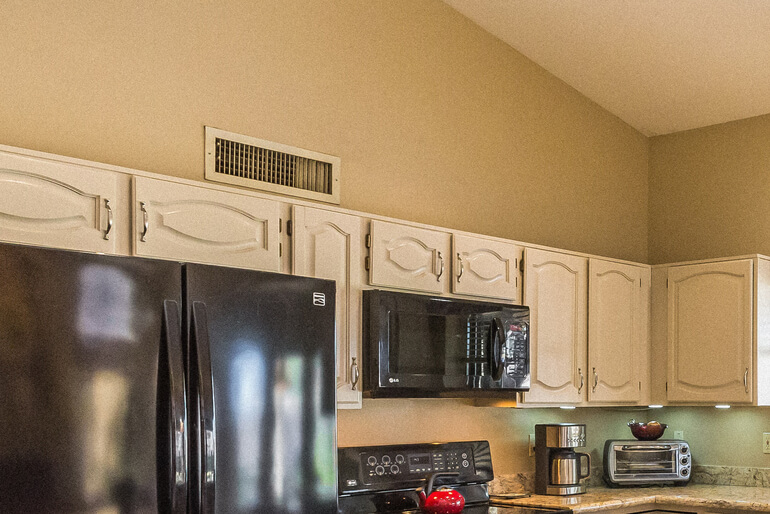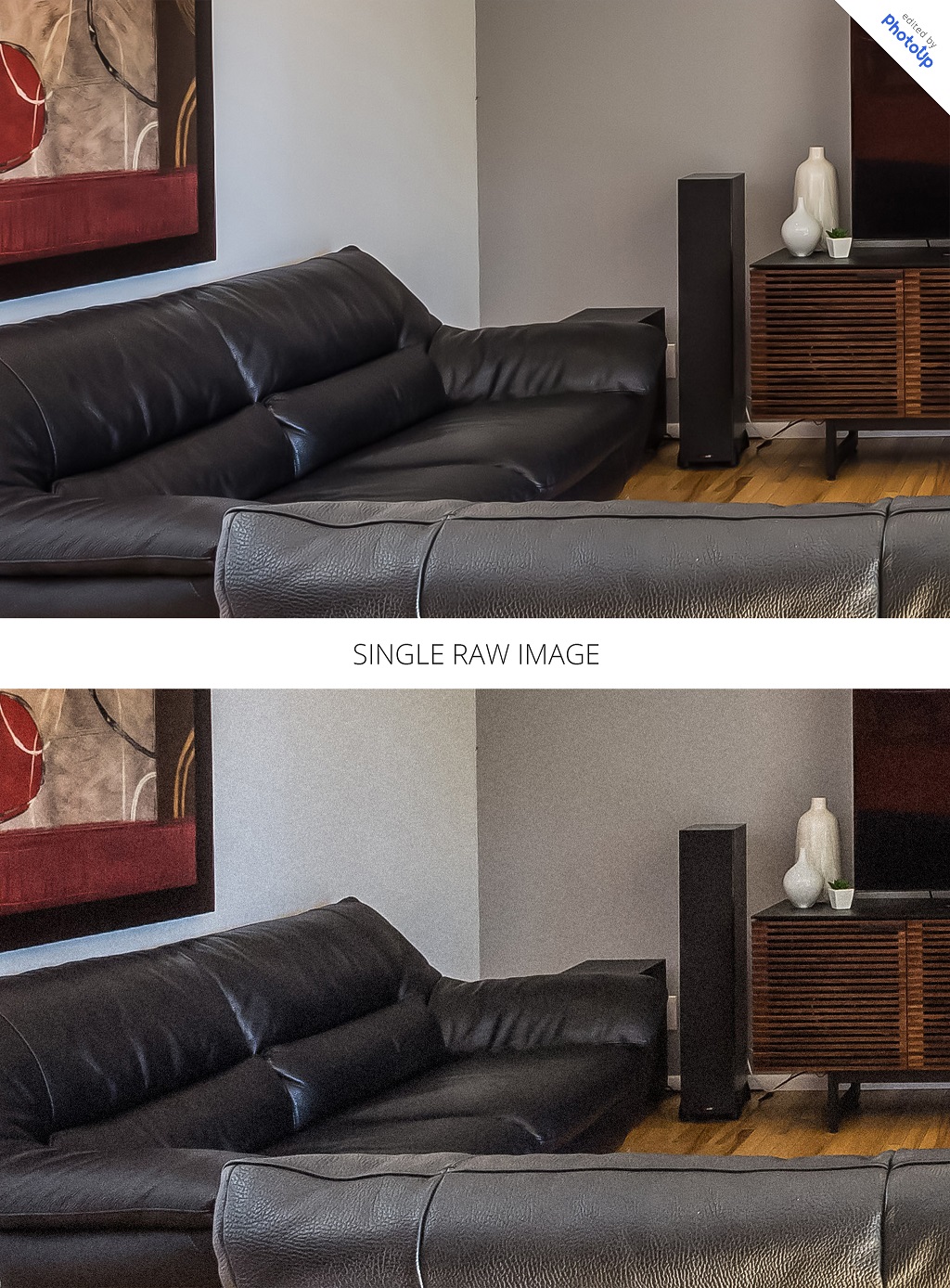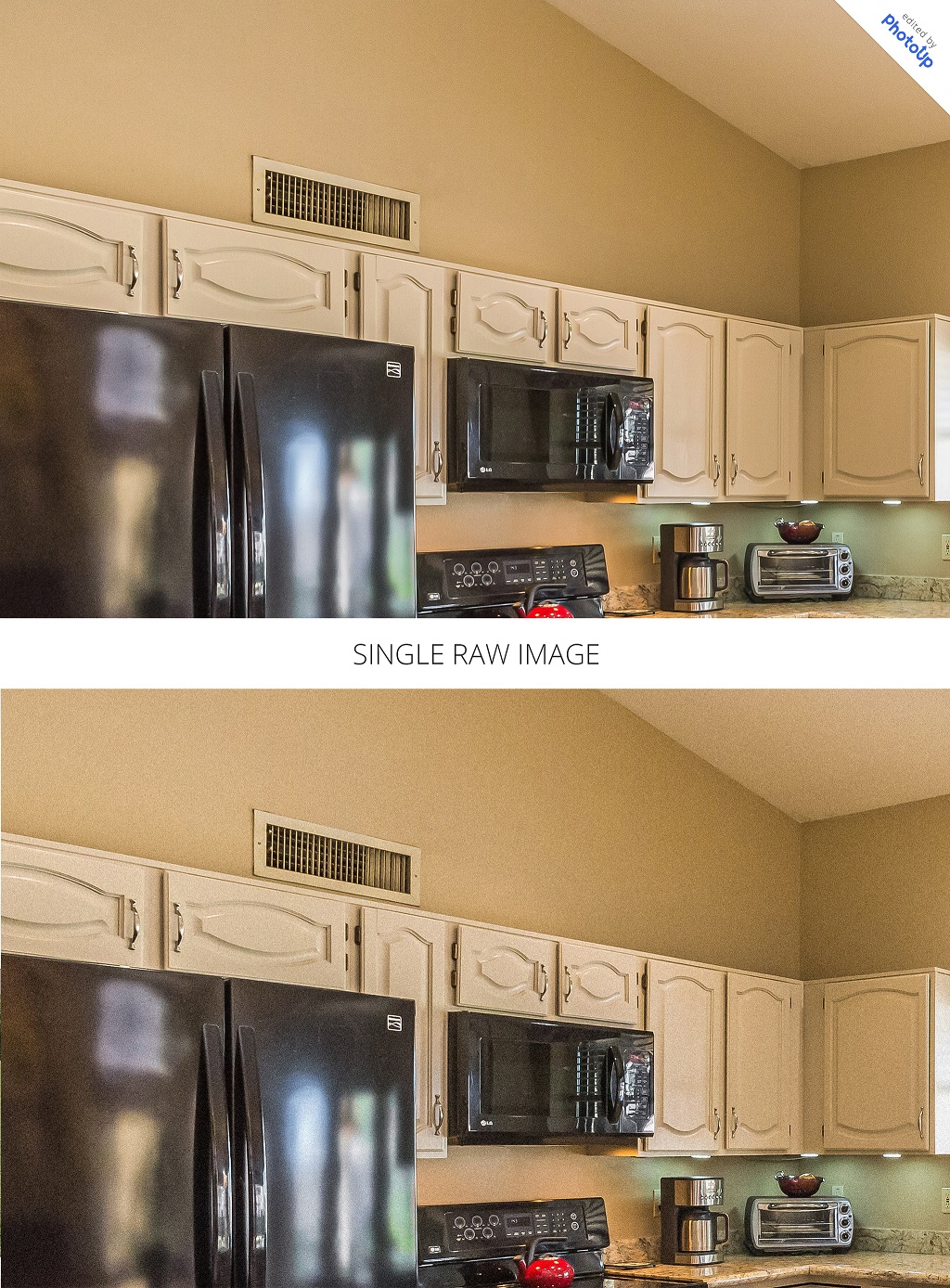Are you looking for ways on how to reduce noise in photos? Then, you’ve come to the right place!
Real estate photographers have been battling forever to reduce that grainy look that they sometimes get in their photographs. Those annoying grains scattered all over the image are called noise.
To understand what noise is and why it occurs, it is useful to know how it occurs in audio signals such as music, podcasts, or transmissions. Noise is an unwanted disruption and imperfection in audio signals.
Often, it sounds like a “hiss” in the background that isn’t something that you hear normally. Yet, this “hiss”, or noise, can be heard in the audio recording itself.
This is the same principle in imagery. In photography, noise refers to visual distortions, which are analogous to audio imperfections. These distortions take the form of tiny colored specks, dots, or pixels in your image. They often make the photo look grainy.
Here’s an example:

Two broad types of noise exist in photos: shot noise and digital noise.
1. Shot Noise
Also called photon noise, shot noise is caused by the natural property of light itself. It is the randomness of the photons (elementary particles of light) in the environment that you are trying to shoot. You see, light reflects off everything we see.
However, these reflections have random patterns, and the number of photons emitted in these reflections varies widely. This randomness causes the grain.
2. Digital Noise
Also called electronic noise, this is noise caused by internal electronics, your camera sensor, or settings (particularly ISO). All these cause image imperfections in the form of noise.
Note that you cannot eliminate noise entirely. Due to the natural property of light and the inherent limitations of photographic equipment technology, there will always be noise in a photo.
Signal-to-Noise Ratio
Another important principle to understanding noise is the signal-to-noise ratio. Let’s illustrate this through an example. Let’s say you captured a scene with insufficient light. We’ll call the image as the signal, or the actual information.
Obviously, the photo will be darker than usual since you didn’t capture enough light from the scene. But when you try to brighten the image using photo-editing software, you also highlight the noise, making the image look grainy and discolored!
That’s because when you amplified the signal (i.e. making the photo brighter), you also highlighted the noise accordingly. This is called the signal-to-noise ratio.
Getting the best-quality image is really all about capturing most of the signal so it will overpower the backdrop noise that, as mentioned earlier, is always present.
Tips on How to Reduce Noise in Your Real Estate Photos
The stitched photo below shows the difference between a clear and noisy image. The noisy photo is at the bottom. The photo above it shows the results after using any one of the tips below.

1. Decrease the ISO
By amplifying the signal, high ISO settings usually generate more noise (remember the principle of signal-to-noise ratio?). As such, lowering the ISO results in a cleaner, crisper image. However, that’s an oversimplification.
You need to adjust your aperture or shutter speed to compensate for the lower ISO, following the principles of the exposure triangle.
2. Use RAW Image Format
Raw files have more data compared to JPEGs. The format does not undergo compression; compression causes noise and other imperfections in the image.
Furthermore, as uncompressed files, RAW files naturally include more data at different exposure levels, allowing one to brighten the image in post-processing without affecting the signal-to-noise ratio as much
High-Quality & Consistent
Real Estate Photo Editing
Hire a dedicated editor with performance metrics from $7/hour.
3. Use a Camera With a Larger Sensor
A camera’s sensor has millions of photosites. These light-sensitive spots gather information from your lens.
A larger sensor, therefore, can gather more information without digital noise distortions. As such, it follows that the larger your sensor is, the less noise there will be.
4. Shoot or Expose to the Right
Overexpose your images a bit, but make sure not to “clip” the image. How do you determine this? You need to check your histogram. If the majority of the curves are on the middle or left of the histogram graph, increase the exposure. If the curves are already off to the right side, then you are “clipping” the image, and you need to reduce the exposure.
What you want is to have the highlights on the right side of the histogram. As noise generally appears in the darker pixels of an image, overexposing your image slightly will give you the maximum amount of signal while reducing noise. Just make sure you use RAW format (see tip 2).
5. As Much as Possible, Avoid Long Exposures
That’s because long exposures have a tendency to heat up your camera’s sensor. This sometimes creates noise, often called “hot pixels.”

6. Reduce Noise in Post-Processing
You can also reduce noise in real estate photos by cleaning up your images in post-processing.
This involves getting rid of grainy or pixelated areas by using editing software like Photoshop and Lightroom.
Let’s show you how…
How to Reduce Noise in Lightroom and Photoshop
To learn how to do this, check out our video tutorial on how to reduce noise in Lightroom and Photoshop:
And just like that you have reduced noise in your images!
If you lack the skill or don’t have time to do the editing yourself, our professional real estate photo editors at PhotoUp can clean up your images in no time.
We use advanced photo-editing software, eagle eyes, and a profound sense of artistry to help you achieve crisp, clear images.
All you need to do is sign up for a free PhotoUp account, upload your images, provide instructions, choose export setting and turnaround time, and that’s it!
Browse Top Dedicated
Real Estate Photo Editors
Ready-to-hire editors for real estate photo editing, and more.
PhotoUp Real Estate Photo Editing Uploader
To see how easy it is to get started with PhotoUp’s software, check out our real estate photo editing uploader tutorial:
As simple as that!
Sign up for a free PhotoUp account today, and let us help take your noisy, granny images to clear perfection! Plus, for a limited time, we even offer you 10 free edits when signing up for an account.
And there you have it!
We hope this blog post gave you some valuable tips on how to reduce noise in photos. If you found this guide useful, you may also want to check out the following resources:






